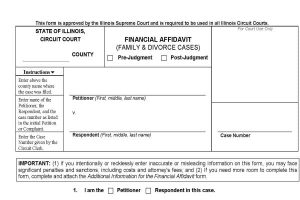
Illinois Divorce: What is the Financial Affidavit used in Illinois Divorces?


It’s always interesting to read the famous Illinois Supreme Court case of In re Marriage of Bates, 212 Ill. 2d 489. As a younger lawyer I was an attorney on this case, and later was subpoenaed by the trial counsel to testify in the case as an expert knowledgeable in the field of Parental Alienation studies. This case is a landmark case in the area of Parental Alienation, as Illinois recognized Parental Alienation as a factor in a child custody decision.
—-Comments from the Court—-
“E, as proponent of the PAS testimony, proffered three expert witnesses and 136 articles from peer-reviewed publications as exhibits.
The question of child support seems to be a basic question, but one that sometimes causes confusion. It used to be some years ago that the noncustodial parent was obligated to pay child support to the parent with the “primary custody of the child or children.” Illinois has largely done away with old concepts of child custody and child support, and now centers its laws on allocating more equally the parenting time of the children, and setting support such that both parents’ incomes are factored in.
Child support is now calculated using an “income shares” model, which considers both parents’ incomes and the number of children. The key factors in determining child support include:
The subject of the use of Artificial Intelligence in medicine, engineering and other professions has become heightened and very contentious. AI, as many people know, has the ability to very quickly aggregate and analyze data (information), and to provide contextual and reasoned answers to questions posed to these computer platforms. The use of AI might be attractive to some lawyers that might use AI to analyze cases, find cases, or to write letters or motions that are submitted to the court.

However, it must be said that Family Law, in particular, is a very specialized and important area of the law, that requires far more than data analysis, or manufactured pleadings. In my view, every client and every family and child has to be assessed and represented as a unique and very individual case. Every situation involving the circumstances of a family, the behaviors of a parent, or the special needs of a child requires not a “data-drive” approach, but a nuanced and careful approach that focuses on an individual and experienced assessment of that client’s goals and needed outcomes.
The Illinois Supreme Court recently published some guidelines on the use of AI by attorneys. echoing the earlier guidelines promoted by the ABA. These comments are what is likely to be the first thoughts on how we as practitioners utilize AI in the management of our cases. From my perspective, AI might be a helpful tool for engineers to fabricate a stronger sheet of metal, but AI truly must be utilized with caution by lawyers managing family law cases that require careful individual assessment and the needed influence of an experienced family lawyer.
Why are the privacy interests of children important in family law cases? A case cited below kind of highlights the need for courts to have the ability to receive information (perhaps from a GAL) in the privacy of chambers with the attorneys (in Illinois, called a “pretrial conference). The reason for this need of hearings, interviews or meetings in chambers is to protect the privacy and personal interests of the minor children, and to not have perhaps sensitive information about a case displayed to the public in open court. Illinois quite effectively acts to protect these privacy interests, in my experience. Most judges will often hear reports from the GAL, or have meetings with the GAL and attorneys, in chambers so that very private information about children are not disclosed in open court.
| Court: Supreme Court of Nevada
Citation: 141 Nev. Adv. Op. No. 4 Opinion Date: January 30, 2025 Judge: Lidia Stiglich Areas of Law: Civil Procedure, Family Law |
| Leanne Nester and Cody Gamble divorced in 2022, with custody arrangements for their two minor children outlined in the divorce decree. Gamble later moved to modify custody, and during the proceedings, a press organization requested media access, which the district court granted. Nester moved for reconsideration, seeking to close the hearing to protect sensitive information about the children, including medical and Child Protective Services records. The district court denied her motion, interpreting a previous case, Falconi v. Eighth Judicial District Court, as precluding closure of family law proceedings.
The district court concluded it lacked discretion to close the hearing, stating there was no statute or rule allowing it. Nester then sought writ relief from the Supreme Court of Nevada, arguing that the district court misinterpreted Falconi and failed to consider her privacy interests and those of her children. The Supreme Court of Nevada reviewed the case and found that the district court erred in its interpretation of Falconi. The court clarified that Falconi does not prohibit the closure of family law proceedings but requires a case-by-case analysis to determine if closure is warranted. The court outlined that closure is permissible if it serves a compelling interest, there is a substantial probability that the interest could be harmed without closure, and no alternatives to closure would adequately protect the interest. The Supreme Court of Nevada granted Nester’s petition, directing the district court to vacate its order denying the motion to close the hearing and to reconsider the motion using the test outlined in Falconi. The court emphasized the need for the district court to properly apply the factors to determine whether closure is justified. |
| A “source of funds” rule refers to a legal principle, primarily used in divorce proceedings, that determines whether a property should be classified as marital or separate based on the origin of the funds used to acquire or improve it; essentially, it means that if a spouse contributes premarital funds to purchase a marital asset, they may retain a separate interest in that asset proportional to their contribution.
The husband filed for dissolution after 18 years of marriage, disputing whether two adjacent lots were marital property. One lot included the marital home, and the other had a barn for the wife’s horse training business. The husband purchased both lots before the marriage, but both were encumbered by loans paid off with a mix of marital and premarital funds. The properties appreciated significantly during the marriage due to market forces. The key issue was whether paying down the loans with marital funds created a marital interest in the properties. The District Court concluded that the lots were nonmarital property, except for the marital contributions toward the loan principals. The court awarded the husband the properties and the wife a cash equalization payment for half of the marital contributions. The wife appealed, arguing that the properties should be considered marital due to the use of marital funds to pay down the loans. The Court of Appeals affirmed the district court’s decision regarding the land portions of the lots, finding them nonmarital. However, it reversed the decision regarding the barn and other improvements on one lot, classifying them as marital property due to the joint efforts in their construction and operation. The court modified the equalization payment to the wife accordingly. The Supreme Court reviewed the case and adopted the “source of funds” rule, which considers the marital estate’s acquisition of equity in the properties through loan paydowns with marital funds. The court reversed the Court of Appeals’ decision regarding the land portions of the lots and remanded the case for a new hearing to determine the equitable division of these properties, considering the source of funds rule. The decision regarding the barn and other improvements was affirmed. |
WHEN CHILDREN RESIST/REFUSE CONTACT with a parent after the breakup of the family, the cause for the contact resistance can be from various sources. When children resist/refuse contact with a parent and when it is objectively determined that parental alienation is the cause for the contact refusal, the issue is quite serious. This is because the contact refusal is without a rational basis and because it is being fueled by a parent whose own needs and wishes are seen as a substantial cause of the child’s resistance. In many, if not most of these cases, the parent who energizes the contact refusal, sometimes referred to as the alienating parent, can also be thought of as perpetrating a form of psychological abuse on the child.

Finally, when selecting experts, keep in mind there are different kinds, and varying skill sets. Some experts are consulting only and not disclosed to the other side. Others are general experts who opine as to hypotheticals presented to them during testimony. And some experts examine the pleadings and read the files to be testifying experts. For this last type of expert, make sure that any testimony they offer is carefully confined to ethical parameters (for example, not offering opinions about parties in litigation that the expert has not directly assessed).
Excerpted from PASG Newsletter: Building a Strong Child-Centered Case in Parent-Child Contact Litigation: A Guide to Research, Experts, and Ethical Strategy Robert A. Simon, PhD, and Virginia E. Griffin, Esq